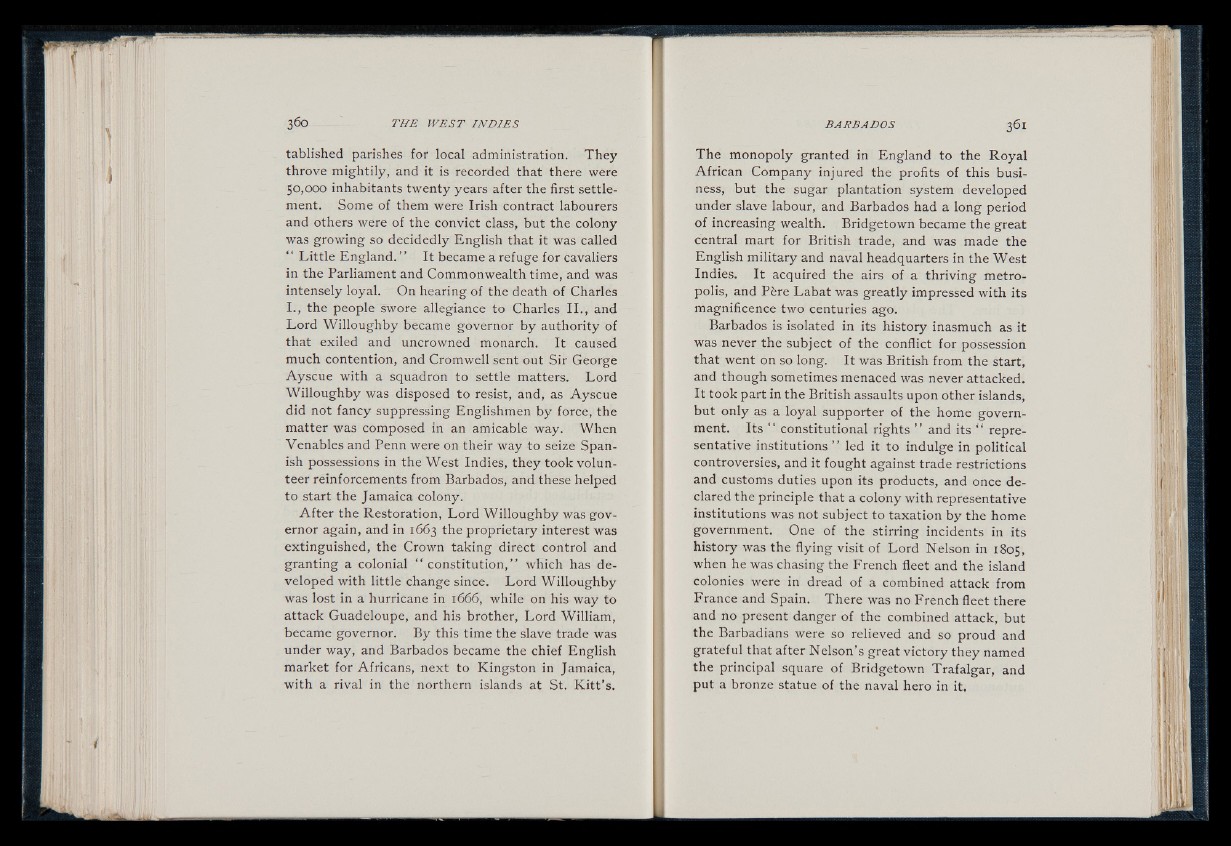
tablished parishes for local administration. They
throve mightily, and it is recorded that there were
50,000 inhabitants twenty years after the first settlement.
Some of them were Irish contract labourers
and others were of the convict class, but the colony
was growing so decidedly English that it was called
“ L ittle England.” It became a refuge for cavaliers
in the Parliament and Commonwealth time, and was
intensely loyal. On hearing of the death of Charles
I ., the people swore allegiance to Charles I I ., and
Lord Willoughby became governor by authority of
that exiled and uncrowned monarch. It caused
much contention, and Cromwell sent out Sir George
Ay scu e with a squadron to settle matters. Lord
Willoughby was disposed to resist, and, as Ayscue
did not fancy suppressing Englishmen by force, the
matter was composed in an amicable way. When
Venables and Penn were on their way to seize Spanish
possessions in the West Indies, they took volunteer
reinforcements from Barbados, and these helped
to start the Jamaica colony.
A fte r the Restoration, Lord Willoughby was governor
again, and in 1663 the proprietary interest was
extinguished, the Crown taking direct control and
granting a colonial “ constitution,” which has developed
with little change since. Lord Willoughby
was lost in a hurricane in 1666, while on his way to
attack Guadeloupe, and his brother, Lord William,
became governor. By this time the slave trade was
under way, and Barbados became the chief English
market for Africans, next to Kingston in Jamaica,
with a rival in the northern islands at St. K i t t ’s.
The monopoly granted in England to the Royal
African Company injured the profits of this business,
but the sugar plantation system developed
under slave labour, and Barbados had a long period
of increasing wealth. Bridgetown became the great
central mart for British trade, and was made the
English military and naval headquarters in the West
Indies. It acquired the airs of a thriving metropolis,
and Père Labat was greatly impressed with its
magnificence two centuries ago.
Barbados is isolated in its history inasmuch as it
was never the subject of the conflict for possession
that went on so long. It was British from the start,
and though sometimes menaced was never attacked.
It took part in the British assaults upon other islands,
but only as a loyal supporter of the home government.
Its “ constitutional rights ” and its “ representative
institutions ” led it to indulge in political
controversies, and it fought against trade restrictions
and customs duties upon its products, and once declared
the principle that a colony with representative
institutions was not subject to taxation by the home
government. One of the stirring incidents in its
history was the flying visit of Lord Nelson in 1805,
when he was chasing the French fleet and the island
colonies were in dread of a combined attack from
France and Spain. There was no French fleet there
and no present danger of the combined attack, but
the Barbadians were so relieved and so proud and
grateful that after Nelson’s great victory they named
the principal square of Bridgetown Trafalgar, and
put a bronze statue of the naval hero in it.